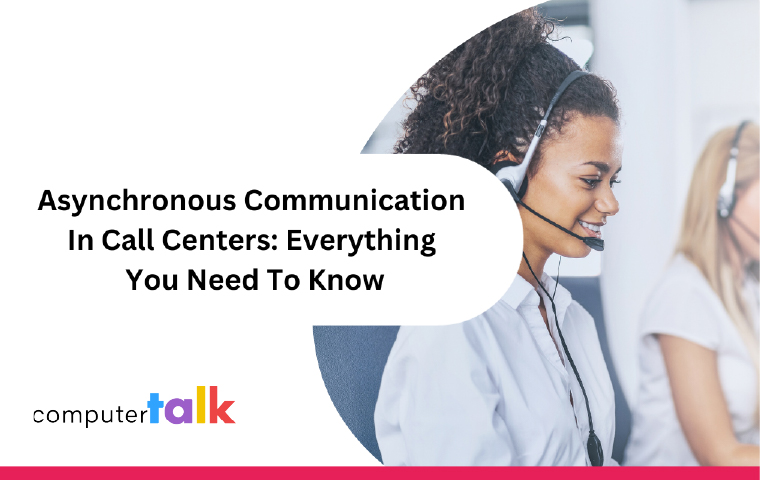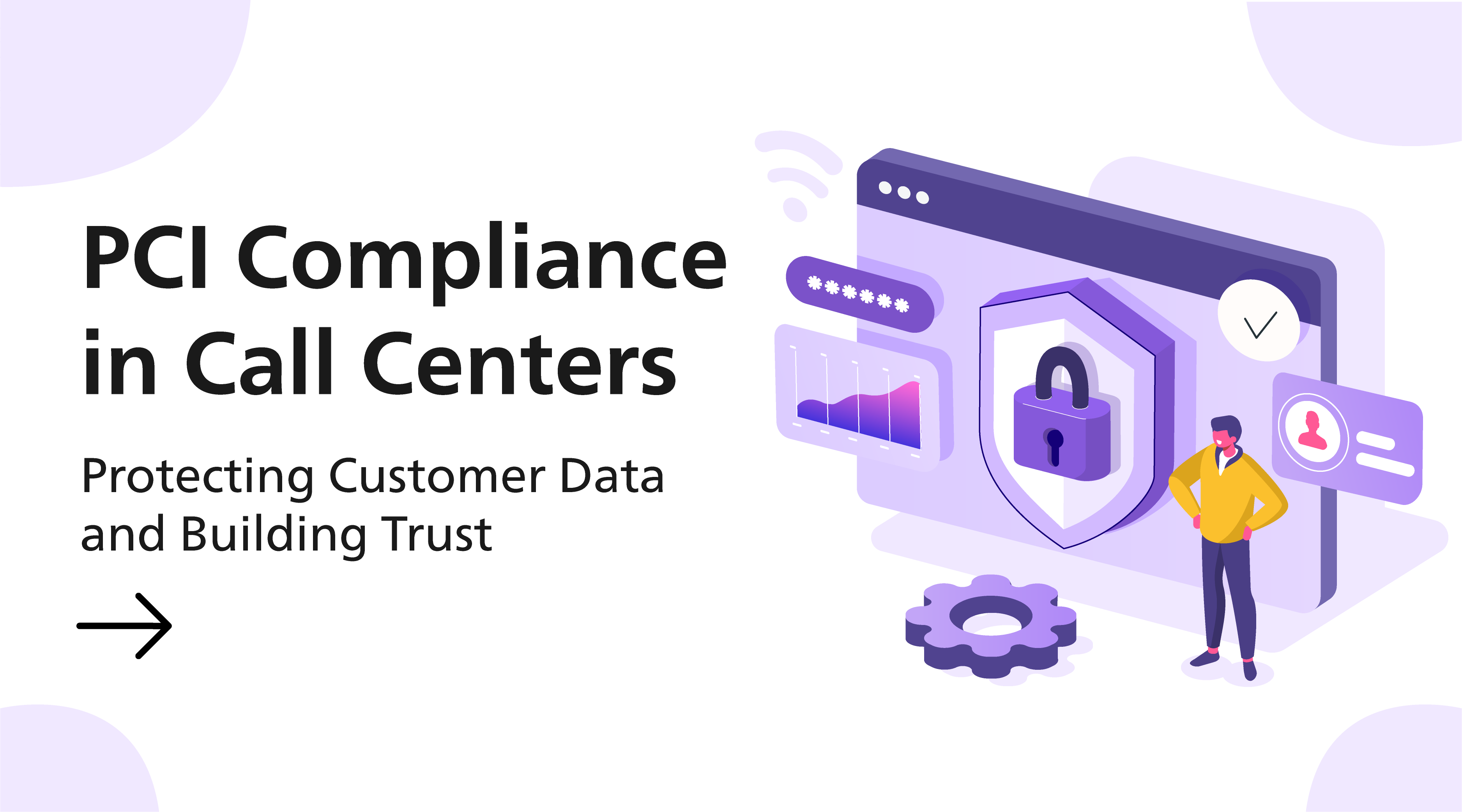Contact Center Vendor Support: How to Choose a Partner You Can Rely On
by Nicole Robinson | Published On February 6, 2025

Contact centers are the backbone of customer experience, serving as the first point of contact for resolving issues, answering queries, and building brand loyalty.
With countless customers saying that customer service directly impacts their loyalty to a brand, you can’t afford to underestimate the value of your contact center solution. But there’s more to choosing the right vendor than comparing software features and deployment options.
Making a decision based on the level of support your vendor can offer and their commitment to training, assisting, and guiding your team is crucial to success. A vendor with the right approach to delivering constant support will help you minimize unexpected downtime, optimize your return on investment, and deliver exceptional experiences to your end users. Here’s how you can make sure you’re choosing a vendor that’s ready to support and empower your business.
Why Reliable Technical Support is Essential for Your Contact Center
It’s easy to get side-tracked when you’re comparing contact center technology vendors. The chances are you spend a lot of time focusing on technical and functional requirements – ensuring that you have the features you need to achieve your customer experience goals.
However, even the best solution is only as good as the support that comes with it. Having access to the right technical support and professional services is how you ensure you can constantly make the most of your contact center technology. It’s your vendor’s support team that will help:
- Minimize downtime: In customer service, even a few minutes of downtime can damage customer relationships and revenue. For every moment you spend trying to fix a technical issue, you could be losing customers and opportunities. Reliable technical support is the key to keeping systems running smoothly, enabling uninterrupted, consistent customer interactions.
- Enhance agent productivity: Technical hiccups disrupt workflows and frustrate agents, impacting their efficiency and morale. Effective vendor support proactively identifies and resolves issues, allowing agents to focus on delivering exceptional service. With consistent workflows and fewer interruptions, your team can maintain peak performance.
- Increase customer satisfaction: Today’s customers expect quick, effective service across all channels. Technical issues can derail their experience, leading to dissatisfaction or even turnover. With robust support ensuring system reliability, customers enjoy consistent, high-quality interactions. This translates directly to improved CSAT scores and stronger customer loyalty.
- Improve ROI: Partnering with a vendor that offers exceptional support drives significant cost savings. Prompt resolutions reduce the risk of prolonged outages, while ongoing guidance helps optimize system usage. Some companies can even assist with training your team members, ensuring you can get the most out of every contact center tool and feature.
Key Features of Robust Contact Center Technical Support
So, how do you identify contact center vendors with a comprehensive approach to delivering excellent customer support? There are various things you can consider, but the most important factors to prioritize when creating your vendor shortlist are:
24/7 Availability
Issues don’t just happen during standard business operating hours. If your contact center technology is operational around-the-clock, your vendor’s support team should as well. The faster you can access support, the less you’ll need to worry about unexpected downtime disrupting your operations.
A vendor like ComputerTalk can give companies access to a team of human agents available to contact via phone around the clock. However, at the very least, it’s crucial to make sure they offer 24/7 access to self-service solutions.
Multichannel Support
Sometimes, the quickest, most effective way to address a contact center technology issue is to phone your vendor. Other times, you might just want to send a quick question via chat or email or connect with an advisor through social media. Make sure your chosen vendor offers a range of contact options.
Whether through phone, chat, email, or self-service portals, multichannel support ensures that businesses can reach technical assistance in the way that makes the most sense for them, and their situation. Be wary of any vendor that only offers a single communication channel.
Expertise and Training
A knowledgeable technical support team is crucial. If your contact center vendor’s support team doesn’t know how to troubleshoot and address various types of issues, how can they help you? Certified technicians with experience in the vendor’s software can diagnose issues quickly, reducing downtime and frustration.
Look specifically for vendors with expertise in the type of contact center technology you’re using. For instance, if you’re leveraging a contact center solution for Microsoft Teams, your vendor’s support team should be deeply knowledgeable about Microsoft’s ecosystem, and integration options.
Proactive Monitoring
The only thing better than a contact center vendor being able to address technical issues immediately, when they arise is a vendor that can prevent problems from occurring in the first place. Leading companies like ComputerTalk use proactive monitoring tools to detect anomalies and potential issues in real time, ensuring they can take steps to reduce unexpected problems.
A company that takes a proactive approach to support can help you avoid costly disruptions and downtime, boosting the efficiency, productivity, and overall performance of your team.
Comprehensive Self-Help Resources
Not every issue requires direct interaction with a technician. Self-help resources, such as FAQs, knowledge base guides, and videos can help you troubleshoot and resolve problems independently – without having to reach out to a service team.
Look for dedicated how-to resources, videos, step-by-step guides, troubleshooting documentation, and even chatbots that can help guide you through ways to fix common problems.
What to Look for When Choosing a Contact Center Vendor
Looking for a contact center vendor with a strong approach to customer support isn’t just about making sure you can fix problems fast. It’s about ensuring you have a stable foundation for a successful future in customer service. Your vendor’s support strategy has a direct impact on your ability to deliver exceptional customer experiences (CX), maintain operational efficiency, and drive long-term success.
While product features are important, the quality of vendor support often determines the real-world performance of your contact center. Here’s what to prioritize when evaluating vendors:
Service Level Agreements (SLAs)
A strong SLA is an instant insight into your vendor’s willingness to take accountability for the impact they have on your organization. It provides clear guarantees for response and resolution times, ensuring that support teams act promptly when issues arise.
Look for vendors that offer transparent and enforceable SLAs, such as a guaranteed initial response within 15 minutes for critical incidents. Make sure you know what you’re eligible to receive as compensation if your vendor fails to live up to their promises too.
Availability and Coverage
Technical issues can happen at any moment, so it’s crucial to ensure your contact center vendor can help whenever you need it – regardless of where you might be located. Ensure your chosen vendor offers 24/7 service across time zones, specifically focusing on the locations where your business operates.
Vendors that offer around-the-clock, local support, like ComputerTalk, will ensure you’re never left stranded during crucial moments.
Versatile Support Channels
As mentioned above, omnichannel support is crucial in today’s world. Different channels are better suited to addressing specific types of issues. For instance, for an urgent matter, you might need to speak to someone immediately over the phone. For a non-urgent issue, it might make more sense to send your vendor an email or chat message.
Make sure your vendor offers a range of support options to choose from, including voice (phone), email, live chat, self-service portals, or even in-person technical assistance.
Dedicated Account Managers
Contact centers often work with huge volumes of customers, which can make it difficult to access fast support when problems arise, as support teams are overwhelmed. Having a dedicated account manager can make a huge difference to your support experience. These professionals serve as your go-to contact for escalations, proactive support, and strategic advice. They provide personalized attention and prioritize your needs.
If your vendor does offer access to dedicated account managers, make sure you know what they’re responsible for dealing with, and whether their support is included in the monthly costs you pay for your service or technology.
Technical Expertise
When issues arise, you need access to skilled professionals who can provide accurate and effective solutions. Choose a vendor with certified technicians and deep expertise in contact center technologies. For instance, at ComputerTalk, our support teams are thoroughly trained on everything about our contact center.
Our teams can quickly troubleshoot and address any issue you might be having with your IVR system, reporting tools, workflow designers, or even AI tools. Plus, they can ensure you have the guidance and tips you need to make the most out of your contact center.
Proactive Maintenance
Great support is proactive. After all, prevention is always better than a cure. Vendors that take a proactive approach to performing updates, applying security patches, and monitoring for potential issues can prevent problems before they occur.
Proactive maintenance can significantly reduce downtime and ensure you spend less time contacting your customer service team or account manager for assistance. Look for vendors that monitor system health in real time and communicate upcoming updates or changes transparently.
Customer Feedback Mechanisms
The best contact center know that the easiest way to ensure they’re adhering to client expectations is to listen to their customers. At ComputerTalk, we actively seek feedback from our customers, using their insights to continuously improve our offerings.
A vendor that encourages your company to share thoughts about their support experiences and demonstrates a commitment to making changes based on your feedback will be more likely to deliver an experience that constantly exceeds your expectations.
Training Resources
While most leading contact center vendors will ensure their technologies are easy to use and implement, your teams still need access to training to make the most of new technology. With that in mind, look for vendors that provide access to webinars, documentation, online learning, and workshops.
ComputerTalk offers access to a comprehensive selection of eLearning solutions, designed to help you upskill your teams, and ensure they can take full advantage of the right contact center technology.
Scalability of Support
As your business grows, your support needs will evolve. Choose a vendor that can scale their support services to match your growth. For instance, they might offer access to “premium support options”, based on your changing needs – like specialized services to help with integration management and proactive monitoring.
They should also be equipped to handle increasing ticket volumes, new communication channels, and additional service requests over time. Vendors with scalable support ensure you won’t outgrow their services, no matter how rapidly your business expands.
Track Record and Reviews
A vendor’s past performance is one of the best indicators of future reliability. Look for verified testimonials, case studies, and third-party reviews that highlight the quality of their support. A strong selection of customer success stories shows you your vendor is trustworthy, reliable and transparent.
If your vendor doesn’t share success stories on their website, look for reviews on other platforms, like G2 or Trustpilot, or ask for references directly.
Contact Center Vendor Support: Must-Ask Questions
Reviewing your contact center vendor’s website, reading testimonials from other customers, and conducting online research can tell you a lot about the type of customer service you can expect to receive. However, few things will help you make the right decision as much as speaking directly to the vendor.
Here are some of the key questions to ask when you’re evaluating your options:
1. What is your average response and resolution time?
Fast response and resolution times are essential for minimizing downtime and ensuring smooth customer interactions. Ask vendors for data on their average response and resolution times for different issue severities. Look for specifics: Do they promise a 15-minute initial response for critical issues?
2. Do you offer dedicated account managers or support liaisons?
A dedicated account manager acts as your advocate within the vendor’s organization, providing personalized attention and offering proactive support. Inquire whether the vendor provides dedicated account managers and how they interact with your team. Ask whether you’ll need to pay additional fees for this level of customized and constant service.
3. How is your technical support structured (tiers and escalation process)?
Understanding the structure of a vendor’s support team is crucial. Ask whether their support is tiered and how the escalation process works. Will you speak to a front-line generalist first, or will you be connected directly to a specialist for complex issues? How long does it usually take to escalate an issue to a subject matter expert or supervisor?
4. Are there SLA guarantees for support services?
SLAs ensure accountability by defining guaranteed response and resolution times. Ask for specifics about their SLA commitments and whether they offer penalties or credits if SLAs aren’t met. Compare the SLAs offered by your vendors to those promised by other providers.
5. Do they provide regular updates or maintenance notifications?
Proactive communication is key to avoiding surprises. Confirm if the vendor provides regular updates, security patches, and advance notifications for scheduled maintenance. Reliable communication demonstrates a commitment to transparency and partnership.
Red Flags to Avoid When Selecting a Vendor
Just as it’s important to look for key indicators that your vendor offers exceptional customer support, it’s also important to be aware of any “red flags” that may suggest the potential for problems. Some of the main red flags to watch out for include:
- Lack of transparency in SLA commitments: A vendor unwilling to provide clear Service Level Agreements (SLAs) is a major warning sign. SLAs outline guarantees for response times, resolution timelines, and system uptime, ensuring accountability. Vendors that avoid offering detailed SLAs or refuse to discuss compensation for non-compliance may lack reliability.
- Poor or outdated reviews: Customer testimonials and reviews are key indicators of a vendor’s performance. Pay attention to consistent complaints about slow support, frequent outages, or poor customer service. Additionally, a lack of recent reviews may suggest your vendor is actively “hiding” negative reviews from unhappy customers.
- Limited Customization or Integration Capabilities: Modern contact centers require flexible solutions that integrate seamlessly with existing systems like CRMs, analytics tools, and third-party applications. Vendors with limited customization options or rigid systems can hinder your ability to adapt to evolving business needs.
- High dependency on third-party contractors: While partnerships with other service providers can help companies to deliver excellent support, they shouldn’t be reliant on third-party vendors completely. Contractors can lack deep knowledge of your vendor’s software and may not adhere to the same standards as in-house support teams.
Making the Right Choice for Long-Term Success
Strong, reliable, and consistent technical support is something every excellent contact center vendor should offer. When you’re assessing your vendor options, focusing on their approach to customer service can help you make a decision that benefits your business in the long term.
The right approach to delivering support means your vendor is committed to ensuring smooth operations, minimizing downtime, and helping you deliver exceptional customer experiences. Don’t make the mistake of underestimating the importance of contact center vendor support when choosing your new technology. Evaluate each vendor carefully, and ensure they can be a reliable partner for your team.
Ready to take your contact center to the next level? Discover how ComputerTalk’s technology and world-class approach to customer support can help you achieve incredible results. Request a demo or consultation today and experience our exceptional customer service for yourself.
More from our blog
 While asynchronous communication, such as email, has been around for decades, its relevance has grown significantly in today’s fast-paced, convenience-driven society.
While asynchronous communication, such as email, has been around for decades, its relevance has grown significantly in today’s fast-paced, convenience-driven society.
 Today’s customers expect faster, more efficient, and more convenient experiences when they contact businesses, but they’re not willing to compromise on the security of their data. That’s why it’s so important for organizations to ensure they’re investing in the right...
Today’s customers expect faster, more efficient, and more convenient experiences when they contact businesses, but they’re not willing to compromise on the security of their data. That’s why it’s so important for organizations to ensure they’re investing in the right...
 During the first day of Ignite, Marissa Salazar, Product Marketing Manager for Microsoft Teams announced 7 exciting new Teams features. Most of these are top features requested in the past year by users.
During the first day of Ignite, Marissa Salazar, Product Marketing Manager for Microsoft Teams announced 7 exciting new Teams features. Most of these are top features requested in the past year by users.

